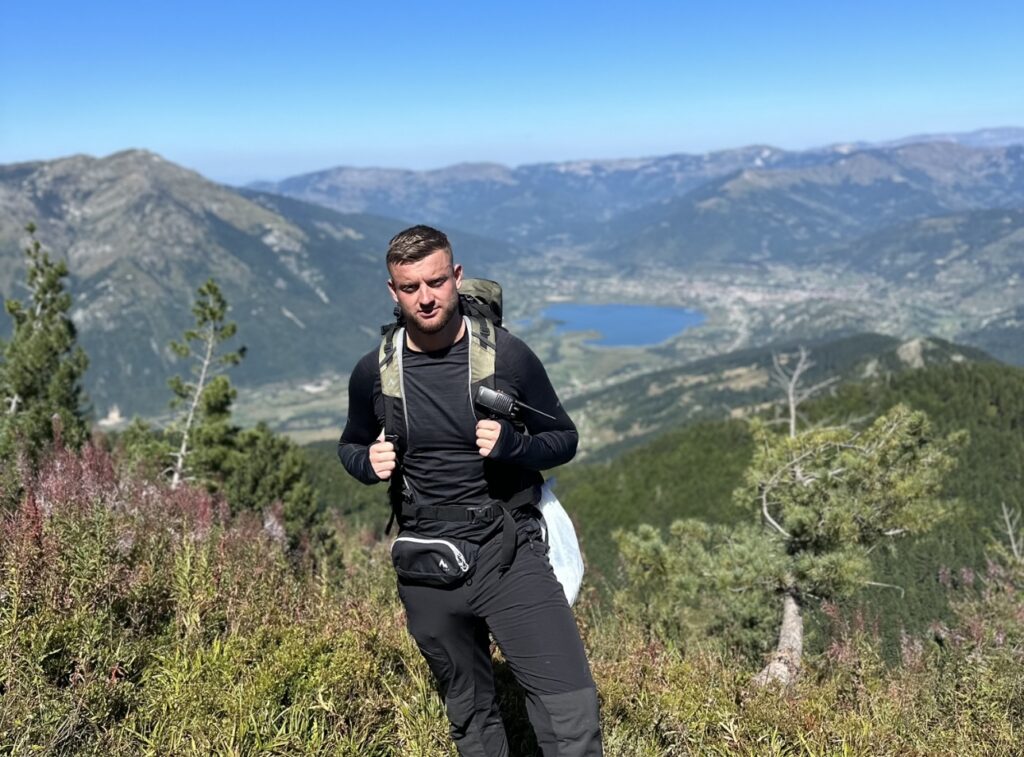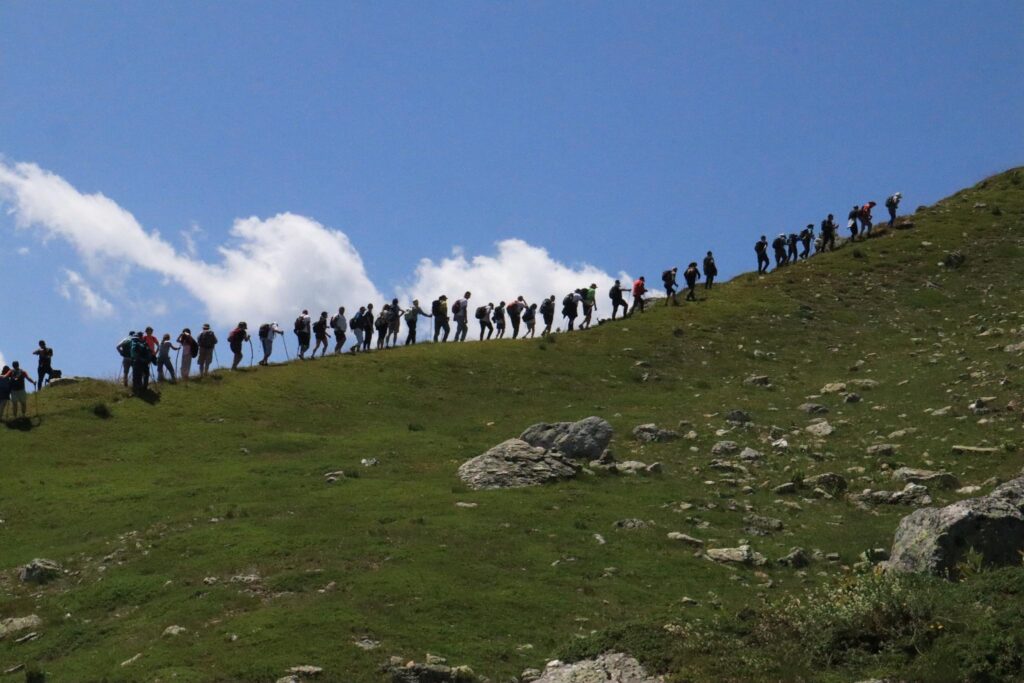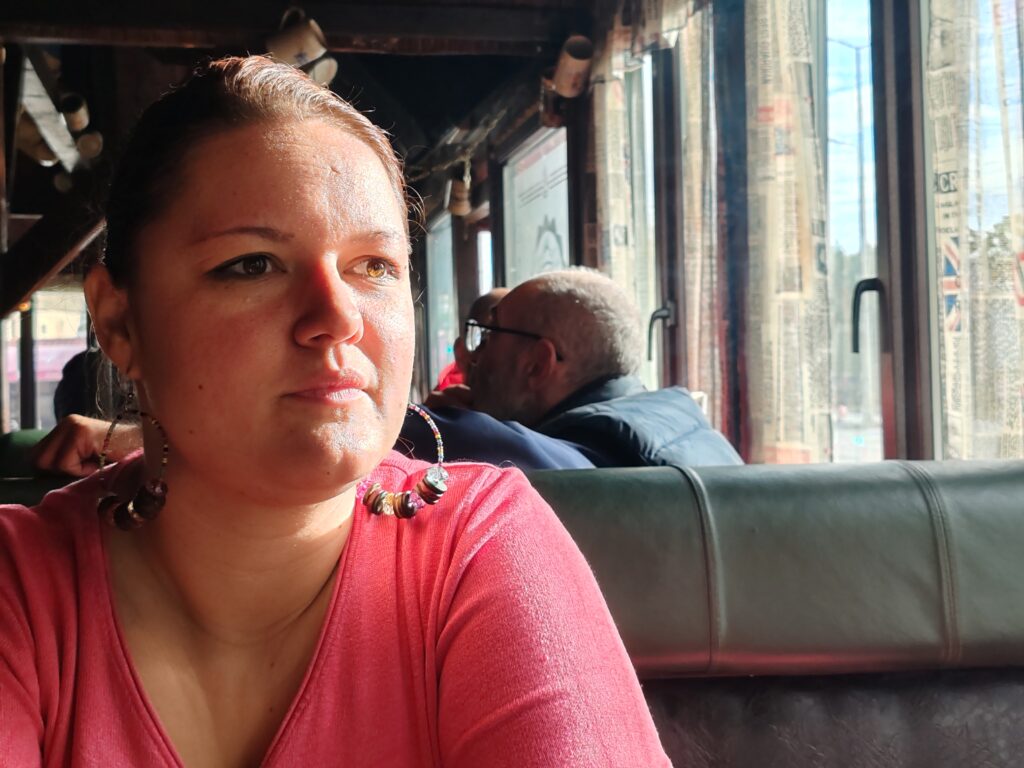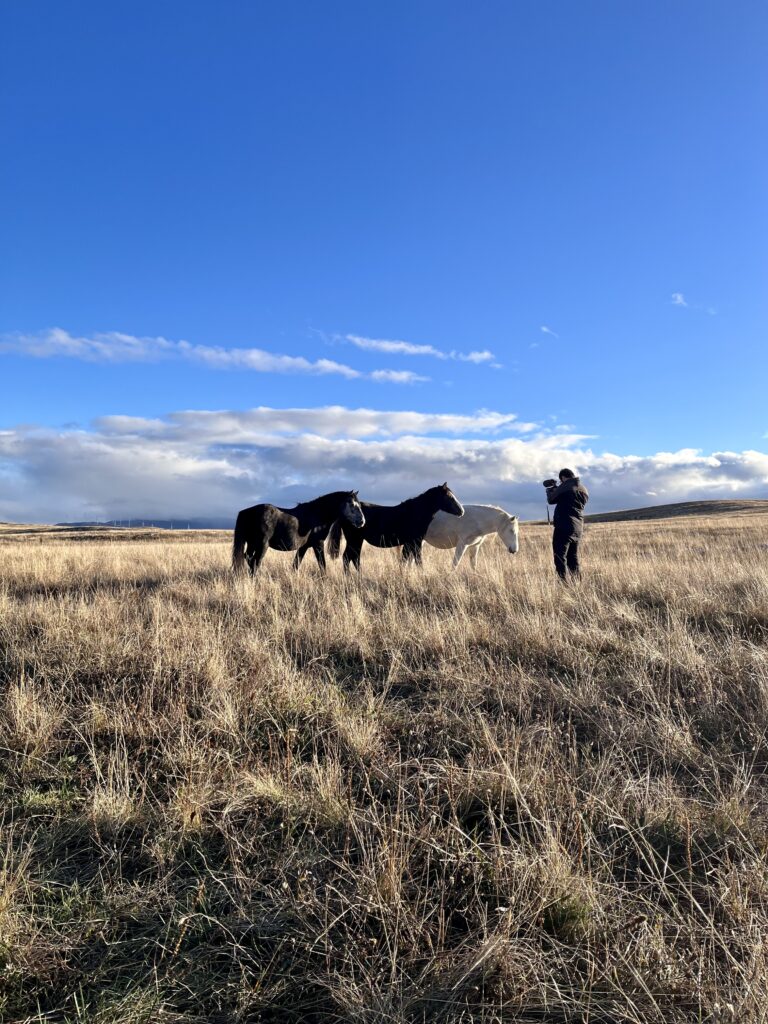This article was originally published in Serbian by Kontrapress.com. Photo by Marin Mamuza, A Crossroad in the Mountains Near Livno.
Once you climb here, you get a better idea of why I stayed, says Marin Mamuza, a 31-year-old photographer and director from Livno, as we are driving towards the Cincar Mountain, famous for its wild horses. And truly, these scenes are worthy of a film set. The sky which constantly changes colours and reconfigures, or an encounter with a herd of wild horses wandering the mountain landscape, make it seem implausible that anyone would even consider leaving a place like this.
“I feel emptiness when I meet people suffering for their home, but it also stirs me when I see schools dying… It moves me when I think whether my own child would have anyone to play with tomorrow, would anyone else be there?”
Marin has already solved this dilemma of whether he would stay, or leave this south-western Bosnian town famous for its extensive diaspora ever since the times of the socialist Yugoslavia – he is staying. Due to the general socio-political situation in the country, many people in small B&H towns would no longer make such a decision.

According to the 2013 population census, Livno had a little above 37 thousand people. However, as the census was not repeated ten years later and no comprehensive statistics concerning migrations is kept in B&H, it is hard to establish today’s numbers. For those staying in these decimated towns, the statistics is of no great importance since they feel this loss of people daily, as it is visible at every step.
“I feel like the 70% of the town has been missing. Seventy per cent of the people from my high school class are abroad. You may talk about different numbers, but we miss the numerous people who have, unfortunately, left,” says Marin.
Even though he finished his studies in Zagreb, Croatia, where he could have lived and worked as an assistant director or photographer on film and TV sets, Marin decided to return to Livno. In his hometown, he started a tourist business dedicated to exploring the natural beauties of the Livno area, with a special focus on the wild horses of Livno, which have become the dominant motif of his photographs and vlogs. He says that he didn’t find the life in Zagreb fulfilling.

“I loved working in my original profession, but I didn’t find the environment fulfilling, since I was spending most of my time waiting at traffic lights, literally,” explains Marin.
Marin tells us about the Livno tradition of sending people to Germany for work, and that both his grandfathers worked in that country. However, unlike today, those who had left sent money to their families staying in B&H, so they also supported the local community.
“Now we have entire families leaving. Children from schools and kindergartens, and people leaving the jobs that they had here.”
A decision reconsidered daily
Hana Milak, a high-school teacher and a representative in the Assembly of Canton 10, also stayed in Livno, at least for now. She says that the situation in this town, but also in the rest of Bosnia and Herzegovina, is so bad that she reconsiders leaving daily. She passed on the opportunities she had to attend a PhD programme in Norway, or stay in the USA where she had secured a job and accommodation.
“Though I have had many different, and I may say exceptional opportunities, I decided to stay in my hometown because of all those who were forced to leave, or intend to leave. I want to make their opinions, attitudes and reasons for leaving heard.”
Hana, whose MA thesis partly dealt with the analysis of the socio-economic condition in Livno, says that the population drain is caused by a number of factors, such as double citizenship, i.e. that of B&H and of Croatia, which secures some rights in the European Union, as well as the geographic position of Livno, i.e. the vicinity of the border with the EU.
On the other hand, additional reasons include unreasonable management of natural and human resources, as well as economic, cultural, political and educational isolation of Canton 10 from the rest of the country.
By the time that this text was written, we had not received any response from the Municipality of Livno to our question concerning the impact of emigration on the local community.
‘How do you know that you are doing the right thing?’
Their decision to stay in their country in spite of the unsecure social and political circumstances, as well as their attempts to create a world of their own and improve the society in which they live, make Marin and Hana exceptions. A similar course, with similar dilemmas, has also been chosen by Eldin Feratović from the town of Plav, at the northeast of Montenegro. He also lives in a town that people generally leave.
Eldin graduated from the University of Nikšić, Department of Geography and finished his MA at the University of Belgrade. Even though he was aware that he didn’t have many options in Plav and that no job was waiting for him, he decided to start a business on his own.
“I founded a scout squad and gathered a group of young people. My intention was to show them the natural wealth of this area that most of them didn’t know about,” says Eldin, who this year, together with 140 other mountaineers, has conquered the peak of Bajrak at Mountain Memina, wherefrom an exquisite view stretches of Plav and its famous lake.

The beginnings were not easy, since the ideas he had were met with much resistance. He encountered difficulties in motivating his peers, as leaving Plav was the only thing they dreamed about.
“At times, I would make an effort and organise something just to realise that there were no people, no interest… You wander how you know that you are doing the right thing.”
According to the 2011 census, the population of Plav was a little above 13,000, which was around 2% of the total population of Montenegro. The population has been continuously diminishing since the 1990s, but Montenegro lacks reliable statistics on the number of people leaving, so one cannot talk about the exact numbers.

The Plan of Strategic Development made by the Municipality of Plav in 2013 quotes a decrease in the economic activity in the town and the war conflicts during the dissolution of Yugoslavia as the main reasons for the population shrinking.
According to the estimates by the local authorities, the total number of people from this municipality who has been living abroad is almost eight thousand, which is more than half of Plav’s current population. The birth rate has been in a constant decrease in the last decade, the educated leave, the number of those capable of working diminishes, while villages and farming for which this area was once famous die out. The local authorities explain that the main reason for the emigration is the economic one.
“The municipal administration invests a lot of effort to substantially improve the life of all citizens, and thus minimise the emigration. Substantial infrastructural investments, support to the economy, crafts, promotion of the tourist potentials, as well as modernisation of the administration in the local government, create favourable atmosphere for all those who wish to work on the territory of our municipality,” says Fikret Canović from the Municipality of Plav.
The efforts and persistence that Eldin invests in staying are often called courage. He perceives his work with children in the scout squad as an opportunity to acquaint the youngest generation with the most beautiful and the most important of what the place they were born in has to offer, and make them follow his own example –finish their studies and return to Plav with new knowledge and fresh enthusiasm.
“My friends and I are local patriots, we love this town more than anything and we all have some organisations through which we make efforts to make it a better place for living,” concludes Eldin.
The luggage long packed
In addition to their identical life goals, Eldin and Marin are also connected by the fact that they both work in tourism so that they could stay in their birth towns. However, this is not the case with Katarina Đoković from Zrenjanin, a town in the north of Serbia. She works three jobs so that she could support herself – she cooks in a restaurant, cleans and maintains homes and business spaces and, as a former journalist, she occasionally, upon demand, writes for media outlets.
As her first job is in Novi Sad, she needs to get up at 5am to get a bus and arrive to work at 7am. After that, she attends to her second job in Zrenjanin and its vicinity. Her work day finishes at 9-10 in the evening.
“When there are some big parties, I even work some in the bar. With these parties, my workday ends at 2-3am,” adds Katarina.

Zrenjanin is the fourth city in Vojvodina according to population, while when it comes to surface area, it is the first in Vojvodina and the second in the entire Serbia. According to the 2022 population census, Zrenjanin has more than 67,000 residents, i.e. almost 9,000 less than at the previous 2011 census.
The reality of living in Zrenjanin strikes you already at the first step – if you want some water to take with your coffee, waiters will tell you that they unfortunately do not have canister water, meaning water in larger packs of five litres or more. They would offer you bottled water, as tap water is not drinkable in Zrenjanin. It has colour, smell and taste and it officially can’t be drunk. The city administration has failed to solve this problems for years, while citizens spend money to obtain drinkable water for themselves. A number of protests has been organised in the city to address this problem, and Katarina Đoković also participated in them as host.
“You fight for water, then you fight for clean air, then you fight for this and that. You fight for your life and for yourself.”

However, just like our previous interviewees, Katarina does not want to leave.
In spite of her exhausting daily rhythm and frequently being unable to provide for the essentials, she is certain that to stay and fight does make sense. She is aware that she works so hard just to secure mere sustenance and nothing more. The luggage has long been packed, she says. And it waits there, ready.
“I am so accustomed to fighting. If I go to some other country, I won’t surly have to fight this hard for the most basic things. Yet then I wonder if I would know how to live in some safe harbour. How could one learn that? I got used to this chaotic existence too much. I toil hard to secure myself some space to stay. I am familiar with ways to survive, I know that it’s bad here, but also that I’m needed,” she clarifies her reasons for staying in the country which, according to the latest census, has lost almost half a million residents.
Just from Vojvodina, 180,000 of people have left in the last ten years.
By the finalisation of this article, we have received no answer from the Municipality of Zrenjanin concerning their position on population emigration.
Marin, Hana, Eldin and Katarina with their everyday fights give their best to maintain life in their small circles and the communities in which they live. Regardless of this fact, they are all deeply aware that their region is a place of leaving.
However, they are not discouraged by this fact, just like Senada Đečević, teacher from the “Bećo Bašić” mixed secondary school in Plav, who is very well aware of the fact that the majority of her pupils have the goal of leaving the town.
“Young people have this impression that living is better and money is easy abroad, so they too want to leave. I am sorry that the youth is moving out en masse. Can you imagine how hard it is to work in a school and listen to these stories – what’s the purpose of this school, it is useless, etc. They earn 500 to one thousand euros abroad weekly, which is more than they can make here in a month. So I have no arguments, yet I don’t give up,” says Senada, a teacher with multiple accolades who has participated in many national and international competitions.
“In spite of all these limitation, I organise projects and additional classes, I send my students’ works to competitions, and I don’t give up, because I get this feeling that if I manage to raise interest in education in at least two out of thirty kids, then I have done something good,” she concludes.
‘It can’t happen to horses to have an unfit leader’
The reasons to leave are different, but the main impetus for emigration is quest for a better living standard and perspective for the future, as it is indicated by a poll realised with B&H youth in 2022. Almost one fourth of the respondents suggested that they were seriously considering leaving B&H for good, while the identical share considered temporary departure.
Another poll realised in Montenegro in 2019 showed that 70% of the youth thought about leaving this country, while 14% had already taken steps in that direction.
When Serbia is concerned, in the latest report by the National Youth Council of Serbia (KOMS) published in 2023, it is stated that almost one half of the respondents have plans for leaving, where 24% of them are in the process of planning their emigration. Around 11% of the youth claim that they won’t be leaving Serbia.
One of the authors of the B&H research, a psychologist working in social research, Andrea Soldo, explains that the reasons for emigration stated include economic ones, such as unemployment and dissatisfaction with one’s financial situation, but these are not the only motives.
“What is prevalent is the feeling of instability and insecurity, enveloped in the sense and perception of the lack of a perspective,” says Ms Soldo.
When asked what might keep them in their country, the youth from this research predominantly referred to their family and friends.
“However, if we take into the account that the majority of one’s friends, or all family members might already be leaving, and that this migratory dynamics is changing, then these reasons for staying are no longer that strong,” clarifies the research author.

The decision concerning one’s place of residence is a kind of investment, emphasizes Marin Mamuza from Livno. However, in Bosnia and Herzegovina, as a post-war society, there is still much warmongering language in the public space, which does not leave space for the sense of stability.
“The war is announced before every election. People don’t want their children living with such leaders. This is one of the primary motives for leaving. On the other hand, emigration has unfortunately become a trend: the so-and-so has left, so why shouldn’t we? Just like the Converse All Stars sneakers among teenagers: he has a pair, so I’ll take one too,” believes Marin who has travelled the world and photographed important cultural and historic sites, before realizing that his photos made in these parts of the world “are just one piece among thousands of identical photos”.
Thus he dedicated himself to wild horses, a motif that, in his opinion, cannot be “exhausted”.
“Horses are specific. The strongest in the herd is the ruler. It can’t happen that someone incapable becomes the leader, someone who won’t be able to find food and provide protection. On the other hand, our wild horses do not leave this area. That’s what has astonished me. There are wolves hunting them here, though when horses are in their herd, wolves can’t harm them. Where their ancestors came, that’s where they stay,” concludes Marin Mamuza.


